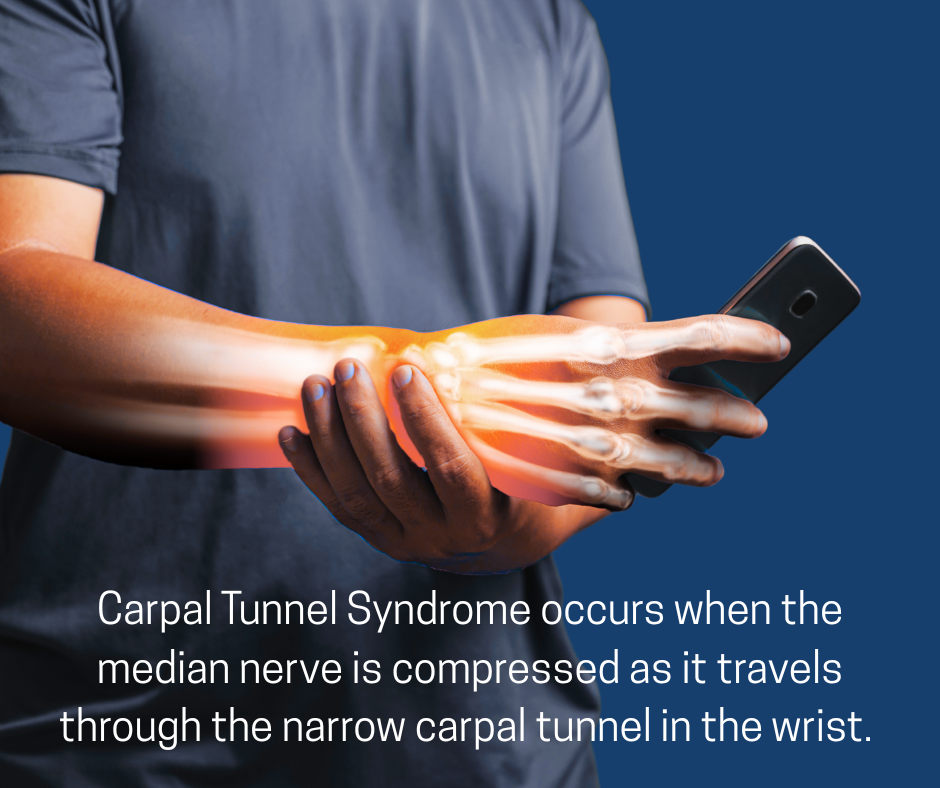Causes and Symptoms of Carpal Tunnel Syndrome

What causes Carpal Tunnel Syndrome?
What are your options for treating it?
Carpal Tunnel Syndrome (CTS) occurs when the median nerve is compressed as it travels through the narrow carpal tunnel in the wrist. This nerve supplies sensation to the thumb, index, middle, and half of the ring finger, and controls some thumb movements. Narrowing of the tunnel from swollen tissues, repetitive stress, or structural misalignment, can pinch the nerve.
Here are some common causes of Carpal Tunnel Syndrome, symptoms you might be experiencing, and a few treatment options.
Causes of Carpal Tunnel Syndrome
- Repetitive Hand Use & Ergonomics
Repeating wrist motions—gripping tools, typing, working on assembly lines, etc.—causes strain, especially with vibration or forced wrist positions. OSHA and NIOSH note these as significant risk factors. - Medical & Physiological Factors
Conditions like obesity, diabetes, rheumatoid arthritis, hypothyroidism, fluid retention (e.g. pregnancy), and genetic predispositions all increase CTS risk. - Trauma & Anatomical Changes
Wrist injuries (such as fractures), ganglion cysts, or joint inflammation can constrict the carpal tunnel.
Common Symptoms
- Numbness, tingling, or burning in the thumb, index, middle, and inside of the ring finger.
- Nighttime discomfort is typical, as sleeping with bent wrists aggravates pressure.
- Weakness or clumsiness, including dropping items or difficulty gripping.
- Muscle atrophy at the base of the thumb (also called the “thenar eminence”) can happen in long-standing cases.
Conventional Treatments
- Wrist Splints. Especially worn at night to maintain a neutral wrist, reducing pressure on the median nerve and improving sleep quality.
- Physical & Occupational Therapy. This can include ergonomic tool adjustments, stretching, nerve gliding exercises, soft-tissue mobilizations, and workstation modifications to improve wrist posture and reduce strain.
- Surgery (Carpal Tunnel Release). Cutting the transverse carpal ligament to permanently decompress the nerve—typically reserved for severe or progressive cases unresponsive to other forms of care.
Chiropractic Care for Carpal Tunnel Syndrome
A structural chiropractor evaluates the neck and wrist to determine if segmental displacements are contributing to nerve compression. If so, adjusting the spine and carpal bones can reduce nerve irritation and manage CTS without surgery, injections or splints. This can also help improve a number of secondary conditions that may present.
Live Near Ann Arbor? We’re Your Friendly Neighborhood Chiropractor!
If you’re struggling with wrist pain, tingling, or numbness, visiting Dr. Gessert could be a valuable next step—especially to see if your spine is contributing to the condition in question.
To get started with an Ann Arbor Chiropractor, schedule a no-commitment consultation by calling 734-221-0362 or submitting a contact form here.






